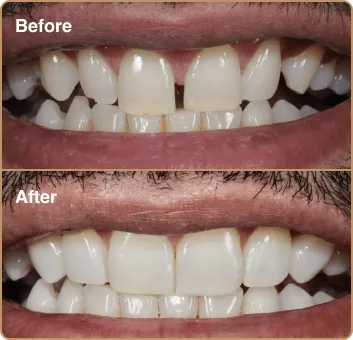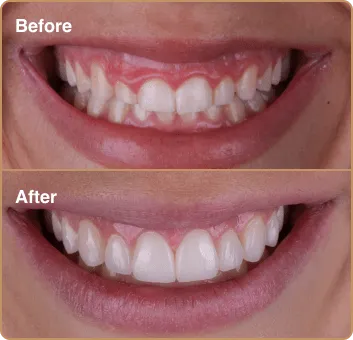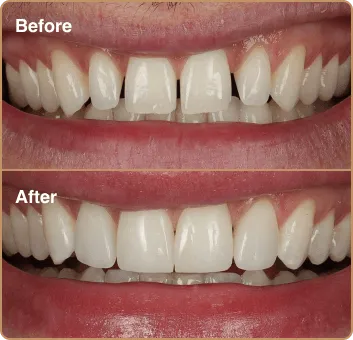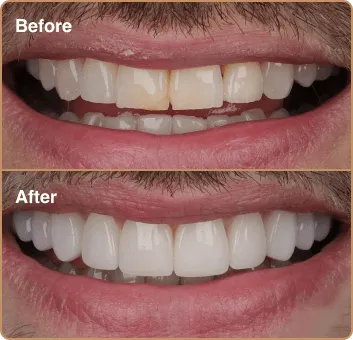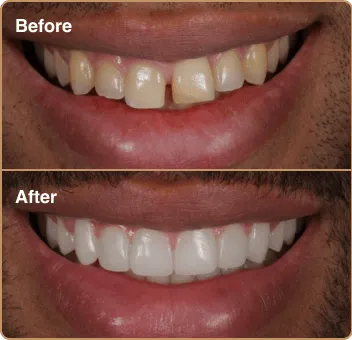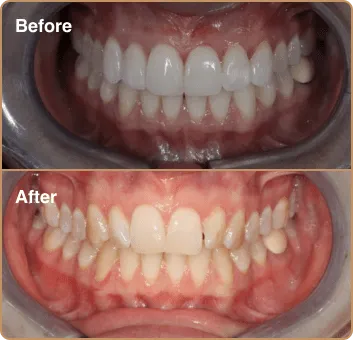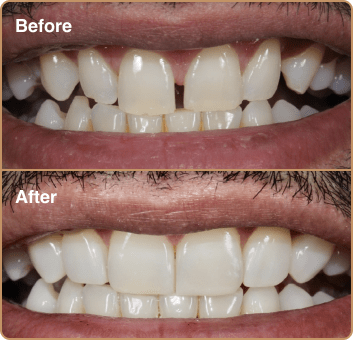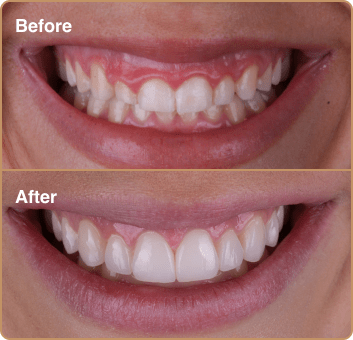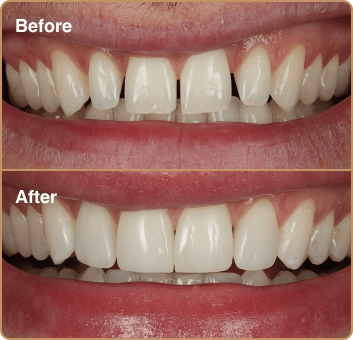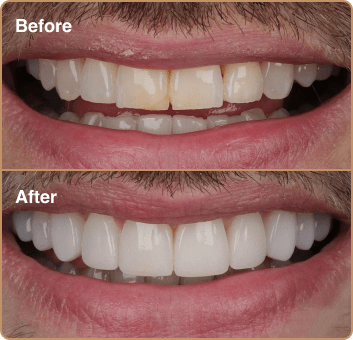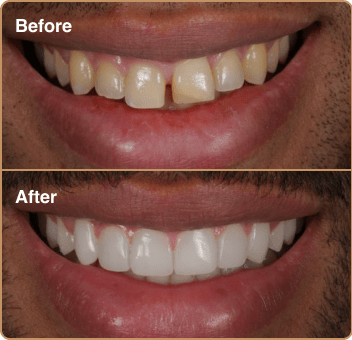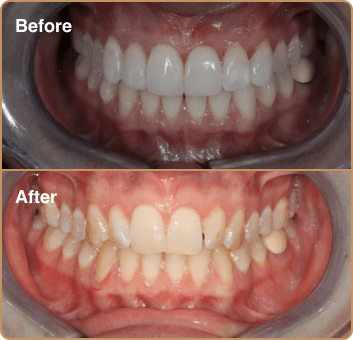0%
Finance Options
Evening and Weekend
Appointments
Free
Consultations
Composite Bonding Before and After
Our patients love composite bonding because of the immediate transformation.
Whether you’re fixing clips or refining the shape of your teeth, the results are fast, natural, and long-lasting.
Other benefits
- No Drilling
- No Needles or injections
- Same day smile transformation
- Preserves natural tooth structure
- Boosts confidence instantly
What is
Composite Bonding?
Composite bonding is the process of applying tooth coloured filling material to the surface of the teeth to change the overall shape, size and colour of the tooth.
Composite bonding is a dental procedure where tooth-coloured resin is artistically sculpted onto the teeth to improve their shape, size, and colour. It blends seamlessly with your natural enamel for a flawless finish.
Composite edge bonding focuses on the edges of the teeth, creating symmetry, repairing chips, and refining your smile without altering the natural tooth.
Situations where composite bonding is suitable:
- Chipped tooth
- Cracks
- Stains
- General Wear
- To improve aesthetic appearance of teeth or smile
- Closing small gaps
- Reshaping uneven teeth
The main benefits are:
- No needles / Injections
- No drilling of natural tooth structure
- Same day result
- Affordable alternative to veneers
- Highly customisable to your facial aesthetics
#cosmeticdentistry #ruhdental
life is too short not to smile
Easy 3 Step Action Plan


Consultation
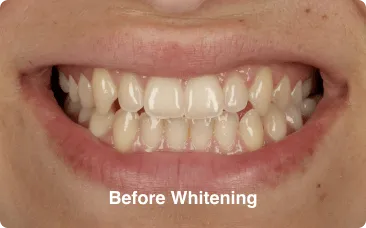

At Home Whitening
for 2 weeks
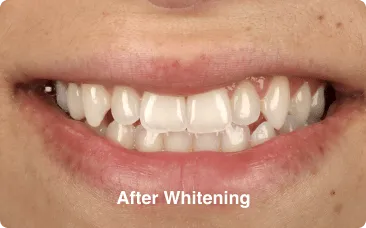

3-4 hour treatment appointment
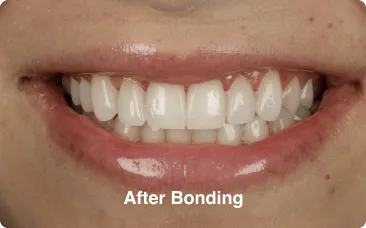
How Much Is Composite Bonding?
Number of teeth
Cost
Monthly
1 Tooth
£410
£22
From £6
2 Teeth
£820
£44
From £13
4 Teeth
£1640
£88
From £26
6 Teeth
£2460
£133
From £40
8 Teeth
£3280
£177
From £53
10 Teeth
£4100
£222
From £66
4 Teeth
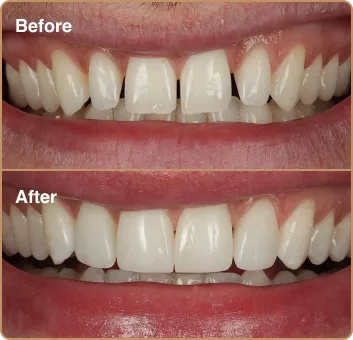
6 Teeth
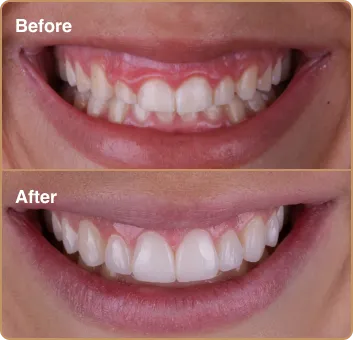
10 Teeth
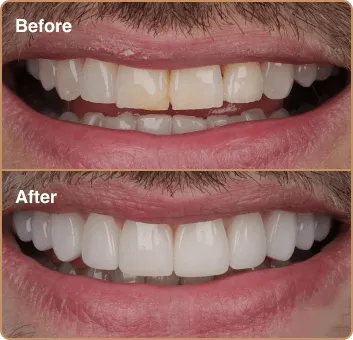
Why Does the cost of composite bonding vary so much?
The rising demand for composite bonding has led to an increase in cases needing to be re-done, especially when cheaper options are chosen without considering potential trade-offs.
If a price seems unusually cheap, it often means compromises in material quality, appointment time, or the dentist’s expertise… all of which affect durability and aesthetics.
Composite bonding is a popular dental treatment that requires careful planning and precision, which may not be the best choice for every patient.
A detailed assessment of tooth shape, size, facial proportions, tooth colour, bite alignment, and long-term function is essential to achieving a natural and durable result.
Factors that influence composite bonding cost include:
- Quality of materials used
- Time taken
- Level of training and ability of the dentist
- Complexity of the case
- Number of teeth treated
- Whether whitening or alignment is needed first
Ensuring the longevity and success of composite bonding calls for meticulous attention to detail and a commitment to delivering high-quality results.
Consideration 1
Making sure the composite bonding doesn’t get stuck under the gums – this can lead to bleeding and gum disease. Healthy gums must be maintained to avoid inflammation, bleeding, and early failure of the bonding.
Consideration 2
To ensure that the sizes and shapes of the teeth are taken into account. Correct tooth proportions ensure your smile looks balanced and natural.
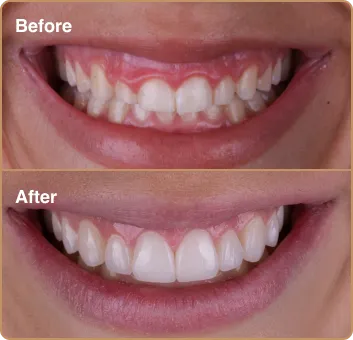
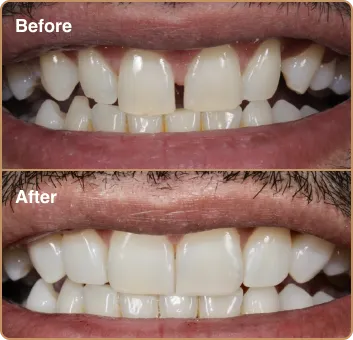
Consideration 3
Ensuring the bite is correct at the end, to avoid the composite bonding chipping. Your bite must be aligned properly to prevent fractures, so in some cases, Invisalign may be recommended for long-lasting results.
Consideration 4
It is also important to ensure that the composite bonding is not stuck between the teeth, which will make it difficult to clean between them. Clean, smooth contact points prevent plaque build-up and make daily hygiene easy.
How Long Does
Composite Bonding Take
On Average, composite bonding on average takes 3-4 hours, depending on the number of teeth treated. Larger smile makeovers require more time to ensure precision and detail.
Take a look at some of our results below:
Google rating score of 4.8 of 5, based on 350+ reviews
Got my Invisalign and whitening with dr Kunal at the Fleet Street branch and it really has been life changing. He’s given me the confidence to smile and laugh without covering my mouth. Very professional and listens to what i wanted and always exceeded my expectations. Also makes the entire Invisalign journey easy and comfortable as he was always there to answer any questions I had at any time. Highly recommend ruh dental and dr Kunal. It really is the best decision I’ve made. Had so many compliments on my teeth, even by strangers.
I’ve been wanting to come to Ruh dental for years for a perfect smile, my experience has been amazing, the whitening kit really has brightened my teeth I’m always getting compliments from everyone so I’m very glad I chose Ruh.
I couldn’t be happier with my experience at Ruh Dental. The staff are all really friendly and helpful, and every step of the treatment was clearly explained with no sales pressure at any time. My dentist was amazing and I’m so pleased with the outcome.
How Long Does
Composite Bonding Last
With good oral care, composite bonding typically lasts 5-10 Years.
Avoiding habits like nail biting, chewing pens, or opening packaging with your teeth can extend its lifespan.
Composite Bonding vs Porcelain Veneers
Both composite bonding and porcelain veneers can dramatically transform your smile, but they work very differently. The right choice depends on how much you want to change, your budget, and how long you want the results to last.
Composite Bonding
Porcelain Veneers
Material
Composite resin (plastic and resin)
Porcelain (ceramic)
Appearance
Natural - but may stain over time
Natural and stain-resistant
Toughness
Less durable - may chip and stain
Highly durable - resistant to chipping or staining
Treatment required
No enamel removal, thus no injections required
Removal of enamel - will require some anaesthetic
Cost
£400 per tooth
From £850 per tooth
Lifespan
5-10 years with maintenance
15-20+ years with maintenance
Repairability
Easily repairable
More complex to repair
Personalisation
Can be completely customised during the procedure
Custom-made in a dental lab for a precise fit
Staining
Regular maintenance polishing required
Minimal maintenance with routine dental hygiene
Maintenance
Single Visit - average 4 hours Yearly maintainence polish required
Minimal maintenance with routine dental hygiene
Treatment Time
Single Visit - average 4 hours
Longer, will require at least 2 visits
Color Matching
Easy to adjust or match color to teeth
Precise color matching is possible along with enhancing whiteness
Who is it for?
Suitable for subtle cosmetic improvements and smile makeovers
For major cosmetic transformations
Strength
Weaker, more prone to chipping
Stronger, resists chipping and cracking
Aesthetics
Natural appearance
Highest level of aesthetics, matching the tooth textures and colour more closely
Reversibility
Reversible - as it can be removed without damaging underlying tooth
Not reversible as enamel is removed, and cant be replaced
Long-term Investment
Will require more frequent replacements
Longer-lasting solution with less replacements and maintainence
Suitablity
Small chips, gappy teeth, or discolorations
Severely stained, misshapen, or misaligned teeth
Frequently Asked Questions
How much does composite bonding typically cost?
Prices for cosmetic procedures like composite bonding will depend on the materials used and how many teeth are being treated. At Ruh Dental, we only use top-quality materials, and prices start from £410 for one tooth, with financing options starting at £6 per month.
How many visits are needed?
The composites themselves are done in one appointment. We will always book a consultation appointment first. Most people will have a review appointment after to ensure they are completely happy.
Will I need an injection?
The great majority of all cases are completed pain-free and without the need for local anaesthetic.
Will my teeth need to be drilled?
In most cases composite is applied with no obvious drilling to the natural tooth. For cases that require tooth adjustment, you will be advised beforehand in the consultation appointment.
How long do composite veneers last?
As with most cosmetic dental procedures they will eventually need replacing. Typically we see good results of up to 5 years for composite veneers and 7 years for edge bonding, dependent upon care.
Is there a minimum number of teeth recommended?
There is no minimum recommendation for this. In order to gain optimal aesthetic results most individuals require approximately 8-10 composite restorations. This allows for a more uniform and symmetrical smile.
Composite bonding or porcelain veneers?
Composite bonding is a single session treatment option which is great to correct smaller imperfections, chips, cracks and minor spacing between the teeth.
Veneers on the other hand are lab made ultra thin sheets of ceramic material which are shaped to fit onto the teeth. They usually require some removal of natural tooth structure to create enough space for the veneer to attach to the tooth. They are normally recommended for larger imperfections of the teeth and as they are lab made, are more costly than composite bonding.
Do your teeth have to be straight first before composite bonding?
We would always recommend straightening before the bonding as it helps. Slight minor misalignment can be masked with composite. However it is always advisable to straighten with braces or invisalign first.
What is the composite bonding procedure?
The tooth surface is thoroughly cleaned and then prepared with a gel that roughens the surface microscopically. The putty like composite resin material is then applied using special instruments and brushes to sculpt to the desired shape, often in several layers. Using a special light, the material is then hardened. Further layers can then be added accordingly. The procedure is then completed with smoothing of the tooth surface and polishing.
Is composite bonding worth the cost?
For many people, composite bonding is an excellent investment. It offers a fast, affordable way to improve the shape, brightness and symmetry of your teeth without the commitment or cost of veneers or crowns. Because it’s minimally invasive and usually completed in a single visit, patients often find it gives them impressive results at a lower price point. If you’re looking for a subtle but transformative upgrade that protects your natural tooth structure, bonding is often well worth it.
Do teeth decay under composite bonding?
The composite material itself cannot decay, but the tooth underneath still can. Decay is usually the result of poor oral hygiene, worn bonding edges or gaps where bacteria can accumulate if the initial work was not done precisely. This is why choosing an experienced cosmetic dentist and maintaining regular check-ups is so important. When bonding is carefully shaped and sealed, the risk of decay is greatly reduced.
What are the negatives of composite bonding?
Composite bonding does come with a few limitations. While it can last five to ten years, some patients eventually need touch ups, so it is not as long-lasting as porcelain veneers. Bonding can stain more easily if you frequently drink coffee, tea or red wine, and it can also chip if you bite your nails or chew on hard objects. For larger cosmetic procedures or patients wanting maximum durability, porcelain veneers may be more suitable. During your consultation, our dentists can explain honestly whether composite bonding is the best option for you.
How soon can I eat after composite bonding?
You can usually eat as soon as the appointment is finished, although we recommend avoiding hard or very chewy foods for the first day. This helps protect the fresh bonding and reduces the chance of early chipping. After that initial period, you can eat normally.





